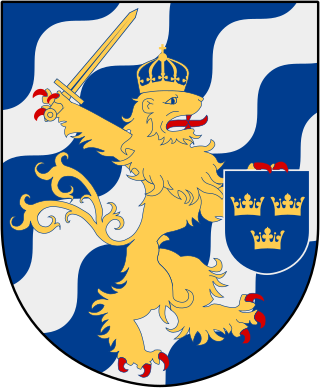British English is the set of varieties of the English language native to the island of Great Britain. More narrowly, it can refer specifically to the English language in England, or, more broadly, to the collective dialects of English throughout the British Isles taken as a single umbrella variety, for instance additionally incorporating Scottish English, Welsh English, and Ulster English. Tom McArthur in the Oxford Guide to World English acknowledges that British English shares "all the ambiguities and tensions [with] the word 'British' and as a result can be used and interpreted in two ways, more broadly or more narrowly, within a range of blurring and ambiguity"..

Gothenburg is the capital of Västra Götaland County in Sweden. It is the second-largest city in Sweden, after the capital Stockholm, and the fifth-largest in the Nordic countries. It is situated by the Kattegat on the west coast of Sweden, with a population of approximately 600,000 in the city proper and about 1.1 million inhabitants in the metropolitan area.

Scottish Gaelic, also known as Scots Gaelic or simply Gaelic, is a Goidelic language native to the Gaels of Scotland. As a Goidelic language, Scottish Gaelic, as well as both Irish and Manx, developed out of Old Irish. It became a distinct spoken language sometime in the 13th century in the Middle Irish period, although a common literary language was shared by the Gaels of both Ireland and Scotland until well into the 17th century. Most of modern Scotland was once Gaelic-speaking, as evidenced especially by Gaelic-language place names.

Scots is an Anglic language variety in the West Germanic language family, spoken in Scotland and parts of Ulster in the north of Ireland. Most commonly spoken in the Scottish Lowlands, Northern Isles, and northern Ulster, it is sometimes called Lowland Scots to distinguish it from Scottish Gaelic, the Goidelic Celtic language that was historically restricted to most of the Scottish Highlands, the Hebrides, and Galloway after the sixteenth century; or Broad Scots to distinguish it from Scottish Standard English. Modern Scots is a sister language of Modern English, as the two diverged independently from the same source: Early Middle English (1150–1300).

Sir William Chambers was a Swedish-Scottish architect, based in London. Among his best-known works are Somerset House, and the pagoda at Kew. Chambers was a founder member of the Royal Academy.

A grammar school is one of several different types of school in the history of education in the United Kingdom and other English-speaking countries, originally a school teaching Latin, but more recently an academically oriented secondary school.

Jan Pieterszoon Sweelinck was a Dutch composer, organist, and pedagogue whose work straddled the end of the Renaissance and beginning of the Baroque eras. He was among the first major keyboard composers of Europe, and his work as a teacher helped establish the north German organ tradition.

The Swedish East India Company was founded in Gothenburg, Sweden, in 1731 for the purpose of conducting trade with India, China and the Far East. The venture was inspired by the success of the Dutch East India Company and the British East India Company. This made Gothenburg a European Centre of trade in eastern products. The main goods were black pepper, spices, silk, tea, furniture, porcelain, precious stones and other distinctive luxury items. Trade with India and China saw the arrival of some new customs in Sweden. The cultural influence increased, and tea, rice, arrack and new root vegetables started appearing in Swedish homes.

Gothenburg Municipality is a municipality in Västra Götaland County in western Sweden. Its seat is located in the city of Gothenburg.

Sylvia Constance Ashton-Warner was a New Zealand novelist, non-fiction writer, poet, pianist and world figure in the teaching of children. As an educator she developed and applied concepts of organic, child-based learning to the teaching of reading and writing, and vocabulary techniques, still used today.
The ELTons are international awards given annually by the British Council that recognise and celebrate innovation in the field of English language teaching. They reward educational resources that help English language learners and teachers to achieve their goals using innovative content, methods or media. The ELTons date from 2003 and the 2018 sponsors of the awards are Cambridge English Language Assessment and IELTS. Applications are submitted by the end of November each year and they are judged by an independent panel of ELT experts, using the Delphi Technique. The shortlist is published in March and the winners announced at a ceremony in London in June. The 2018 awards were held in a new venue, Savoy Place, Institute of Engineering and Technology, London, UK.

The history ofGothenburg begins with the foundation of the city in 1621, although by that time people had already been living in the area for thousands of years, since the Neolithic Period, and moreover there had already been a series of earlier settlements on the lower Göta Älv, including one which also bore the name Gothenburg.

Teach Yourself is currently an imprint of Hodder Education and formerly a series published by the English Universities Press that specializes in self-instruction books. The series, which began in 1938, is most famous for its language education books, but its titles in mathematics are also best sellers, and over its long history the series has covered a great many other subjects as well. "A Concise Guide to Teach Yourself", compiled by A R Taylor, was published in 1958 and listed all the titles up until then.
British ballet is most recognised for two leading methods, those of the Royal Ballet School and the Royal Academy of Dance. The identifying characteristic of British ballet is the focus on clean, precise technique and purity of line that is free of exaggeration and mannerisms. The training of dancers in Britain is noted for its slow progression, with a great deal of attention paid to basic technique. British ballet methods operate on the principle that establishing correct technique and strength slowly makes it much easier for the student to adapt to more difficult vocabulary and techniques later on.

Norway–United Kingdom relations are foreign relations between Norway and the United Kingdom. The two nations have enjoyed very close cultural, economic, military and political cooperation since Norwegian independence in 1905. Both countries are central allies in NATO, and also have many bilateral agreements involving trade and military ties. Recently, the two have collaborated extensively to provide intelligence and arms to Ukraine during Russia's invasion of that country in 2022.
Motley Theatre Design Course is a one-year independent theatre design course in London. It was founded at Sadler's Wells Opera in 1966.

James Nimmo Britton was a British educator at the UCL Institute of Education whose theory of language and learning helped guide research in school writing, while shaping the progressive teaching of language, writing, and literature in both England and the United States after the Dartmouth Conference (1966) of Anglo-American English educators.
Queen's Birthday Honours are announced on or around the date of the Queen's Official Birthday in Australia, Canada, New Zealand and the United Kingdom. The dates vary, both from year to year and from country to country. All are published in supplements to the London Gazette and many are formally conferred by the monarch some time after the date of the announcement, particularly for those service people on active duty.

United Kingdom–Sweden relations are relations between the United Kingdom of Great Britain and Northern Ireland and the Kingdom of Sweden. Both countries are members of the COE and NATO.
Samuel Holroyd "Tim" Burton was a British school teacher, college lecturer and prolific author of English language textbooks and books about the west of England. He also produced fiction, assembled anthologies and wrote a biography of William Shakespeare.














